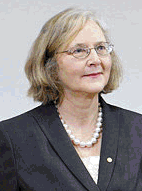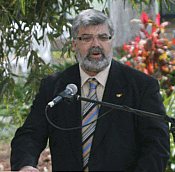|
Prof Elizabeth Blackburn |
Is Australia Doomed to Lack Opportunities for Pursuing High-risk, Open-ended Science? |
Science Minister Kim Carr |
Australia, with a current estimated population of 22.1 million, ranks 51st in a list of 223. That represents ~0.33% of the world's population. But just as a point of comparison the combined population of Denmark, Switzerland, and Sweden is 22.6 million.
The GDP in 2009 for Australia is listed by the CIA World Factbook as US$920 billion while the combined GDP for Denmark, Switzerland and Sweden is US$1190 billion.
So is it unreasonable to dispute our leaders oft repeated mantra that "Australia punches above its weight".
And mightn't we reasonably consider the President of the Australian Academy of Science, Kurt Lambeck's recent comment that Australia lacked the same opportunities for pursuing high-risk, open-ended science partly because, "In the US you are operating in a much bigger pool", a misleading comparison?
Professor Lambeck also told The Australian's Andrew Trounson that while government initiatives to boost scientific infrastructure, such as the $1.1 billion Super Science initiative, would create more opportunities to pursue basic research, Australia still lacked critical mass among researchers.
Now if a nation of 22 million with a GDP of over a trillion Australian dollars can't find the interest to sustain a "critical mass among researchers" there is something highly questionable in its determination of priorities.
Nevertheless perhaps there is reason to have some optimism. Steven Chu made the comment a while back that in dealing with members of the US Congress, it helped to have a Nobel Prize.
Will the now sometime presence of Australia's quiet, but plain speaking, 2009 Nobel Laureate, Elizabeth Blackburn, stir our governmental representatives to up the proportion of carrot to stick when moving to improve the country's tertiary education / research sector?
"I think there are tremendously good scientists in Australia but sometimes I just feel, are they really being able to run with it in the way they are capable of?" Professor Blackburn asked rhetorically of Mr Trounson, and went on to say that in the US, she benefited from a five-year grant that allowed her to follow her nose without having to write up "damn little" reports and catalogue milestones on a regular basis. "This was the perfect setting and I'm not aware that I would have been able to do that [here]." And to make sure she was getting her message across: "Short dribs and drabs" of money with tight constraints on basic research are in her opinion wasteful.
If the welfare of Australia's citizenry in the 21st century will be dependent on a knowledge economy the evolution of its educational system needs radical improvement and that can't happen unless the resourcing of its tertiary sector is markedly and sustainably improved.
Despite the rhetoric, that's not the case, and certainly the destructive disinterest of the federal opposition in the matter allows the government to dally.

